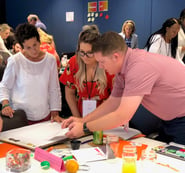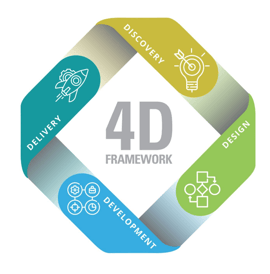Ever since “Growth Mindset” came on the scene many years ago, the education space has been abuzz—and rightfully so. Carol Dweck’s game-changing psychological research has had a major impact on how we think about teaching and learning, including entrepreneurship education.
Ultimately, we now know having a growth mindset leads to greater accomplishments than believing one’s abilities are innate or fixed no matter what we do—which makes a lot of sense if you think about it. It’s the difference between someone believing they have what it takes to succeed if they put their mind to it vs. knowing for sure that the outcome is already decided from the start.
It's that age-old question: “What would you do if you knew you couldn’t fail?” Or as we at Uncharted Learning like to ask our member schools: “Are you brave enough to let your students fail?”
Reframing Failure & Cultivating an entrepreneurial mindset
Actually, stop and think about it. Would you approach life or school differently if failure wasn’t a threat? When we re-frame failure as just part of the process on the journey to success, we see challenges differently. Having a growth mindset means moving from a “why bother?” to a “why not?” approach to trying new things and tackling problems—which is really what entrepreneurship is all about.
 The “Entrepreneurial Mindset” is another way of approaching learning from a growth orientation. Instead of assuming that entrepreneurs are born, an entrepreneurial mindset approach positions entrepreneurship as a capacity that can be developed through a combination of compelling and current content, professionally trained teachers, industry-connected mentorship, and direct experience leading an entrepreneurial endeavor of one’s own—which is exactly what Uncharted Learning programs are designed to do.
The “Entrepreneurial Mindset” is another way of approaching learning from a growth orientation. Instead of assuming that entrepreneurs are born, an entrepreneurial mindset approach positions entrepreneurship as a capacity that can be developed through a combination of compelling and current content, professionally trained teachers, industry-connected mentorship, and direct experience leading an entrepreneurial endeavor of one’s own—which is exactly what Uncharted Learning programs are designed to do.
Moving from Mindset to Action
While our programs advance the entrepreneurial mindset of our educators and students, we also know that it takes more than a mindset to truly become entrepreneurial in practice. What we’ve learned in working with our incredible network of Uncharted Learning member schools and industry partners is that an entrepreneurial mindset is only part of the story. Successfully building the entrepreneurial capacity of students, teachers, schools, and communities also requires actioning specific tools, developing critical 21st-century skills, and adopting new habits.
and students, we also know that it takes more than a mindset to truly become entrepreneurial in practice. What we’ve learned in working with our incredible network of Uncharted Learning member schools and industry partners is that an entrepreneurial mindset is only part of the story. Successfully building the entrepreneurial capacity of students, teachers, schools, and communities also requires actioning specific tools, developing critical 21st-century skills, and adopting new habits.
Uncharted Learners
Uncharted Learning programs intentionally incorporate industry-standard tools and purposeful application so that teachers and students are actively utilizing the most current, cutting-edge strategies for innovation, design, project management, and business development.
Being entrepreneurial requires a multi-dimensional, head-heart-and-hands approach to life and learning. Entrepreneurship is behavioral—it’s a way of seeing the world, but also a way of acting in it, and feeling empowered—and that’s what it means to be an Uncharted Learner.
 Uncharted Learners—the students, teachers, administrators, and industry volunteers that power our programs—unquestionably have an entrepreneurial mindset.
Uncharted Learners—the students, teachers, administrators, and industry volunteers that power our programs—unquestionably have an entrepreneurial mindset.
They are critical thinkers, creative problem-solvers, innovative, resilient, opportunity-seeking, and unafraid to take risks - all the things we know make up an entrepreneurial mindset. But Uncharted Learners also go beyond mindset: they’re truly walking the talk of entrepreneurship, building their entrepreneurial capacity, using real-world startup tools, and applying entrepreneurial skills, habits, and behaviors in practice through our programs.
Uncharted Learners:
- Ask bold questions—they use inquiry-based learning strategies, reflection, and creativity to find and solve critical problems in new ways.
- Tinker, test, and iterate—they actively experiment and apply problem-based learning strategies and lean methods to develop innovative solutions.

- Influence and impact—they share their ideas and contribute new learning to their networks.
- Design thinkers—they “Design for Delight” and use industry-standard tools and methods for designing solutions, solving problems, and managing projects.
- Team players—they apply collaborative and peer learning strategies to accomplish goals in partnership with other key stakeholders.
- Bounce back—they understand “failure” as part of the entrepreneurial process and demonstrate resilience, resolve, and grit in the face of challenges and setbacks.
- Happen-makers—they are experiential “doers” who leverage a bias toward action to take initiative and bring ideas into reality.
- Own their role—they are self-directed, reliable, and accountability-driven with a deep desire to make good on promises made to themselves and others.
Just like actual entrepreneurs, our framework for entrepreneurship education is multi-dimensional—or dynamic, complex, and layered. Mindset is one component of our program design, along with real-world, leading-edge, industry-connected tools developed and used by actual entrepreneurs that give learners a chance to practice entrepreneurship, apply a startup skillset to real-world challenges, and adopt entrepreneurial habits and behaviors.
 Using our own community of learners and industry partners for inspiration, we identified four distinct dimensions of entrepreneurship that encompass the skills, knowledge, behaviors, mindset, content, and tools required to build entrepreneurial capacity in practice.
Using our own community of learners and industry partners for inspiration, we identified four distinct dimensions of entrepreneurship that encompass the skills, knowledge, behaviors, mindset, content, and tools required to build entrepreneurial capacity in practice.
Uncharted Learning youth entrepreneurship and professional development programs empower learners to:
- Cultivate a set of entrepreneurship skills and knowledge
- Practice entrepreneurial behaviors, actions, or habits
- Adopt an entrepreneurial mindset, or set of beliefs, perspectives, and approaches that shape one’s worldview
- Effectively utilize leading-edge industry content and tools
Uncharted Learning's 4D Framework
This entrepreneurial development process in our programs happens across four distinct dimensions of entrepreneurship, which we’ve defined as:
 Discovery: Adopting a spirit of curiosity, creativity, imagination, innovation, optimism, problem-finding, and opportunity-seeking.
Discovery: Adopting a spirit of curiosity, creativity, imagination, innovation, optimism, problem-finding, and opportunity-seeking.
Design: Approaching challenges as inherently solvable through a process of complex thinking, creative problem solving, and purposeful design.
Development: Actively experimenting, tinkering, testing, iterating, team-building, and project-managing.
Delivery: Effectively communicating, packaging, and telling compelling stories of big ideas while actively connecting with and influencing key stakeholders.
In our 4D Framework for Entrepreneurship, each dimension stands alone and can be taught, learned, and accessed in any order—while also creating the potential for powerful synergy when dimensions are experienced simultaneously.
Exploring Entrepreneurship Cross-Curriculum
The reality is that being entrepreneurial means being multi-dimensional. It requires an ability to move freely within, between, and across dimensions of discovery, design, development, and delivery depending on the situation or challenge at hand.
Explore what that means across all aspects of curriculum via Uncharted Learning's new program, Entrepreneurship Across the Curriculum.
